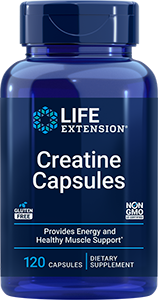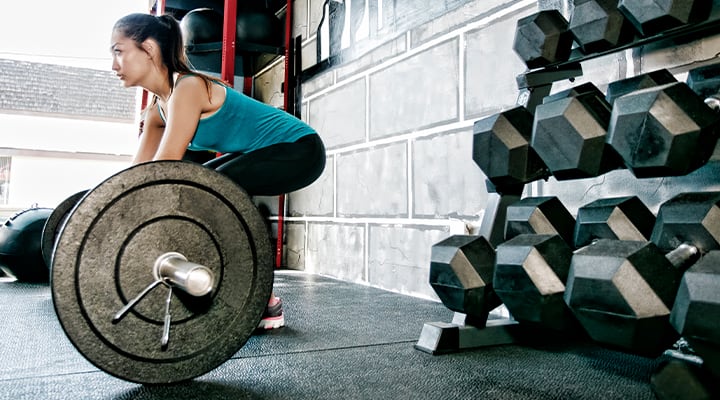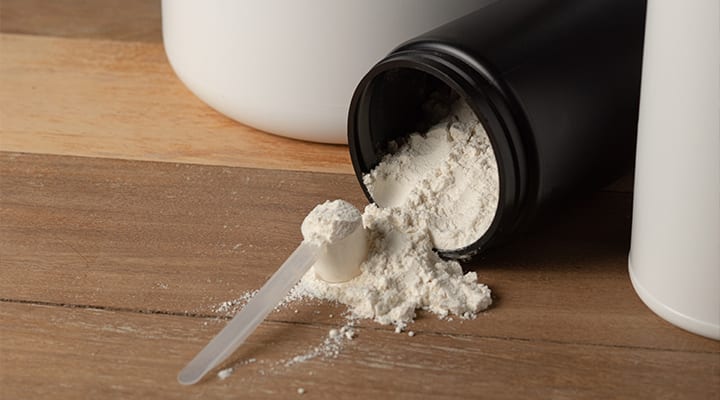
Creatine for Women: Benefits, Uses and More
Published: November 2023
If you've participated in any kind of resistance training program, chances are you've heard talk about creatine supplementation. Words and phrases like "creatine monohydrate powder," "better athletic performance" or "major muscle growth" might have been thrown around by your coach or the seemingly more sophisticated athletes at the gym.
But if your main motivation for working out is just to stay fit and look toned, the thought of taking creatine supplements might sound a little like overkill. After all, you're not exactly a bodybuilder—you just want to strengthen your muscles and keep them healthy!
But the truth is, creatine is not that advanced. It's actually a quite simple sports nutrition supplement that can offer a multitude of benefits. And contrary to the myths, it doesn't make female athletes resemble their male counterparts!
What is creatine?
Creatine is an amino acid derivative that comes from the amino acids glycine, arginine and methionine. The body naturally produces creatine, but you also get about half of your creatine supply from the food you eat. Meat, dairy and seafood are common sources of creatine.
Once consumed or produced, creatine primarily gets stored in skeletal muscle as both free creatine and its phosphorylated form, phosphocreatine (also known as creatine phosphate). When your skeletal muscles need energy, they turn to their creatine stores to help support muscle function. A steady supply of energy is especially important when you're powerlifting heavy weights or exercising at a high intensity. For this reason, many weightlifters choose to augment their diet with creatine supplements.
Should women take creatine supplements?
Of all the vitamins and supplements women can take to support an active lifestyle, creatine rarely makes the cut, if at all. For whatever reason, creatine supplements have always been more popular among men. But it's time to flip the script, because the female gym-goer has just as much—if not more—to gain from creatine supplementation as men.
In fact, one review even found that women exhibit 70-80% lower endogenous (internal) creatine stores than men and typically consume less dietary creatine compared to men. These two factors alone make a strong argument for creatine supplementation in women. But that's not all!
The review also found compelling evidence that creatine supplementation can benefit women through their different hormone-related changes, making it particularly important for women throughout all stages of life—including during menses, pregnancy, post-partum, and during and post-menopause.
This review also showed that creatine supplementation can benefit pre-menopausal females when it comes to improving strength and exercise performance. High doses of creatine can also benefit skeletal muscle size and function in post-menopausal women.
What does creatine do for women?
The best supplements for women are the ones that can multitask, which is exactly why creatine deserves a spot on your shelf. In addition to increasing creatine muscle stores, creatine supplementation has also been found to support all of the following:
Provide energy to your muscle cells—
Remember: When you consume creatine (either from food or supplements), it gets stored in muscle cells as creatine phosphate. During short bursts of activity, like sprinting or weightlifting, creatine phosphate quickly links up with adenosine diphosphate (ADP) and creates adenosine triphosphate (ATP). If you took notes during middle-school science class, you know ATP is the energy source for all cells in the body. So, by getting adequate creatine every day, you help maintain a steady supply of energy to your muscle cells.Improve strength and athletic performance—
Being a key source of cellular energy translates to major gains in your exercise routine, particularly improvements in muscle growth and muscle strength. In a clinical trial of previously untrained young women, 10 weeks of creatine monohydrate supplementation combined with resistance training resulted in a 20-25% increase in muscle strength compared with placebo.Creatine has no age limit, though. In fact, it can support women at all stages of life. After a 24-week trial, researchers concluded creatine supplementation with resistance training improved lean muscle mass and muscle function in post-menopausal women as well.
Support brain and mood health—
Sure, an extra cup of coffee might fire up your brain cells, but what about a glass of water to wash down some creatine? In a review, creatine supplementation in humans has found consistent improvements in cognitive function and performance and reduces mental fatigue during stressful mental tasks in healthy adults.This may be true for all adults, but women have a unique need for creatine supplements. Not only do women have lower creatine stores in their muscles, they also happen to have lower levels of creatine in the brain, particularly in their frontal lobe. The frontal lobe plays an integral role in mood, cognition, memory and emotion.
Promote muscle recovery—
Regardless of whether you do resistance training or cardio on the treadmill, you need a post-workout recovery strategy. When your muscles take on a lot of stress, the muscle fibers start to break down, an indication that they need rest. The good news is if you recover your muscles properly post-exercise, your muscle fibers will grow back bigger and stronger. What does that have to do with creatine? Creatine supplementation helps activate satellite cells in your muscles for optimal recovery.Boost cellular hydration—
Creatine also helps boost water content in your muscle cells. Increased water content is great for supporting muscle growth and avoiding dehydration.
Explore Our Best Active Lifestyle & Fitness Supplements
Does Creatine Cause Weight Gain?
Some women worry that water retention will show up as weight gain. Truth be told, excessive water retention from creatine supplements only occurs if you're taking large amounts of creatine daily along with a high intake of carbohydrates.
Most women do not take nearly enough creatine for that to be an issue. In fact, for those worried about creatine negatively affecting their body composition, research has yet to show that creatine supplementation is associated with weight gain in females—or any other adverse health outcomes for that matter.
Which form of creatine works best?
Creatine supplements are usually found as one of the following three types:
- Creatine hydrochloride (aka creatine HCl)
- Creatine ethyl ester
- Creatine monohydrate
Creatine supplements are available in many forms, including capsules, tablets, powders and even pre-workout drinks. While having multiple options can be confusing, the choice is rather clear. Creatine monohydrate in any form is the one that researchers most commonly use to evaluate creatine's health benefits and, therefore, is the most prevalent in scientific literature. Because it's the most research-backed, it's no surprise that creatine monohydrate is also the most common type used in supplements. This means you're more likely to find a high-quality creatine monohydrate at a great value.
More importantly, though, creatine monohydrate is the only type that's been shown to increase creatine stores in the body. In fact, over the last 30 years, several studies have shown that creatine monohydrate supplementation (e.g. 5 g/day for 5-7 days or 3-5 g/day for 30 days) supports healthy blood, muscle, and tissue levels of creatine and phosphocreatine in the body. So, if you're looking for the best form of creatine for you, creatine monohydrate is it.
Should creatine supplements be taken every day?
When to take creatine and how often is a personal decision, but it may help to know that creatine monohydrate is a low-risk dietary supplement. In fact, research has consistently shown long-term daily creatine supplementation is safe when consumed in recommended doses. That's why it's so important to always follow the manufacturer's directions on the supplement bottle. But if you have any questions or concerns about beginning or continuing creatine supplementation, it would be best to discuss them with your healthcare provider.
Pro tip: If you're wondering whether to take creatine monohydrate pre-workout or post-workout, you're not alone. This has been debated in the sports nutrition world for a while, but honestly, there's no right answer. As long as you're consistent with the amount and frequency in which you take creatine monohydrate supplements, you'll get the benefits.
How long to notice the benefits of creatine?
When you notice the benefits of creatine monohydrate depends on how much you're taking and the length of time you've been taking it. When it comes to creatine supplementation, a larger daily intake of creatine monohydrate will saturate your muscle creatine stores much faster than small daily doses and, therefore, may produce faster benefits.
Although research suggests 20 grams of creatine supplementation per day for five to seven days is the amount that will best saturate muscle creatine stores, this should only be done short term, if at all. Similar muscle creatine increases can be achieved with a gradual intake strategy of 3 grams of creatine per day for approximately 28 days.
Research suggests that the average person may need 2-3 g/day of oral creatine supplementation to maintain normal creatine stores depending on diet, muscle mass, and physical activity levels, but individuals who have above-average physical activity levels and muscle mass degrade creatine into creatinine at a higher rate than others.
Creatine for women: Main takeaways
The number one lesson in all of this is: Women should not shy away from adding creatine supplements to their sports nutrition routine. Women have a lot to gain, especially when you consider these quick facts:
- Creatine is an amino acid derivative that supports skeletal muscle strength and athletic performance.
- Women have naturally lower stores of creatine than men, making creatine supplementation in active females important.
- The most-researched type of creatine is creatine monohydrate.
- Creatine monohydrate powder is easy to find and mixes well with any pre-workout drink or post-workout smoothie.
- Studies suggest creatine supplements are safe to use on a daily basis without worry of occasional bloating or weight gain.
- Approximately 2-3 g/day of creatine is sufficient for maximizing muscle stores. But, if you regularly train at high intensity or have high muscle mass, you may degrade your stores of creatine at a higher rate.
Not sure what to take? Our supplement quiz can help you find the right formulas for your health and fitness goals.
References
- De Guingand DL, et al. "Risk of Adverse Outcomes in Females Taking Oral Creatine Monohydrate: A Systematic Review and Meta-Analysis." Nutrients. June 2020. Https://www.mdpi.com/2072-6643/12/6/1780
- Gualano B, et al. "Creatine supplementation and resistance training in vulnerable older women: a randomized double-blind placebo-controlled clinical trial." Exp Gerontol. May 2014. Https://pubmed.ncbi.nlm.nih.gov/24530883/
- Kreider RB, et al. "Bioavailability, Efficacy, Safety, and Regulatory Status of Creatine and Related Compounds: A Critical Review." Nutrients. March 2022. Https://www.ncbi.nlm.nih.gov/pmc/articles/PMC8912867/
- Ribeiro F, et al. "Timing of Creatine Supplementation around Exercise: A Real Concern?" Nutrients. August 2021. Https://www.ncbi.nlm.nih.gov/pmc/articles/PMC8401986/
- Smith-Ryan AE, et al. "Creatine Supplementation in Women's Health: A Lifespan Perspective." Nutrients. March 2021. Https://www.ncbi.nlm.nih.gov/pmc/articles/PMC7998865/
- Vandenberghe K, et al. "Long-term creatine intake is beneficial to muscle performance during resistance training." J Appl Physiol. December 1997. Https://pubmed.ncbi.nlm.nih.gov/9390981/
- "Creatine." Cleveland Clinic. April 2023. Https://my.clevelandclinic.org/health/treatments/17674-creatine.









